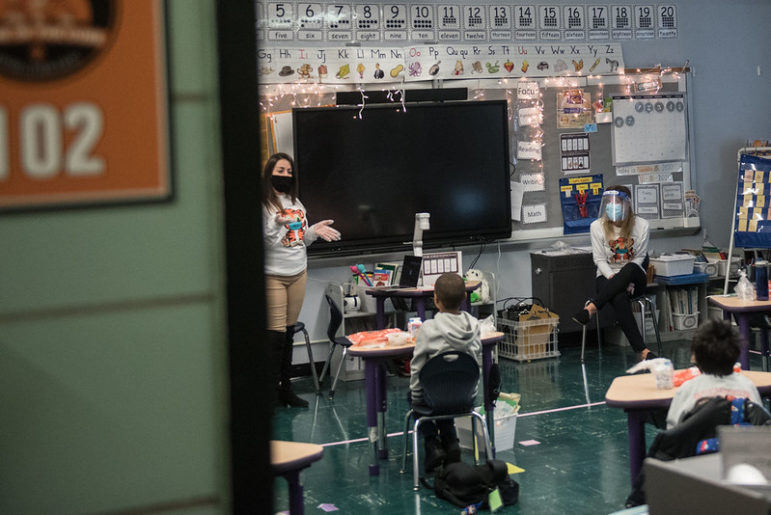“Reaching children at much earlier ages to teach them about healthy relationships and how to identify abuse will provide them with the foundations to safety and resiliency and provide our youngest New Yorkers with an additional layer of protection against harm.”

Michael Appleton/Mayoral Photography Office
Pandemic procedures in a classroom at P.S. 5 Port Morris in the Bronx in December.When New York City implemented its first city-wide relationship abuse prevention program in 1999, it was the first of its kind in the nation. New York has a long history of leadership in domestic violence prevention, setting precedents that have become a model across the US—most states now have some form of abuse prevention training in schools.
New York once again can lead the sector with a promise for our kids’ future. By expanding youth violence prevention programming to include youth in domestic violence shelters and at a much younger age, we have a real opportunity to break cycles of violence among children who have already been impacted by violence and pioneer a new model of targeted, youth-based violence interruption.
Schools provide us with one opportunity to change behavior and reduce violence before New York’s kids reach adulthood, when habits are set and widespread education efforts become more difficult. That’s why the Urban Resource Institute (URI) currently administers its Relationship Abuse Prevention Program (RAPP) to 40,000 middle and high school students across the city annually.
Our outreach also must target the most at-risk youth: children growing up in violent households who have firsthand experience with domestic violence. Unfortunately, children who experience violence at an early age are more likely to continue the cycles of violence into adulthood as victims or perpetrators of future harm. Reaching children at much earlier ages to teach them about healthy relationships and how to identify abuse will provide them with the foundations to safety and resiliency and provide our youngest New Yorkers with an additional layer of protection against harm.
What we’ve learned from RAPP and Early RAPP is that the earlier we can reach people, the more likely we are to break those cycles of violence and of abuse. School-based prevention programs can elicit a change in culture, fostering an environment where no form of violence is acceptable. In some cases, these programs are able to reduce truancy, increase social engagement, and even improve academic performance.
Expanding these programs—to elementary school students as well as the first cohort of students living in domestic violence shelters—is a high priority for experts in domestic violence prevention, which is why URI has requested $3.5 million from the state to be included in the 2023 fiscal year budget.
This investment would help URI implement a 3-year pilot expanding RAPP into a transitional and emergency DV shelter, helping to target some of the most at-risk youth who would benefit from additional services and support. The expanded program will be tailored to an elementary-age cohort as well as middle and high school aged youth. No provider currently offers RAPP to youth in shelter, meaning the needs of one of our most vulnerable populations is not being addressed. New York can set a new precedent by providing youth in the shelter system with comprehensive anti-violence and healthy relationship education.
While not a cure for domestic violence, RAPP programs are an essential part of prevention efforts, especially in youth who are exposed to violence at an early age. These expansion efforts have the potential to create a more informed, less-violent generation of New Yorkers.
Let’s remember 2023 as the year when RAPP was introduced into elementary schools and domestic violence shelters, when children in New York became better equipped to participate in healthy relationships throughout their lives.
Luis Matos is the senior director of prevention services at Urban Resource Institute, where he helps lead the country’s largest school-based teen Relationship Abuse Prevention Program (RAPP).







